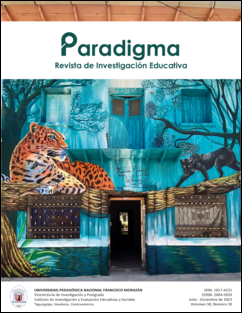Strategies for Autonomous Learning of English as L2 of Pre-Intermediate English Courses at UGC and ESIDE
DOI:
https://doi.org/10.5377/paradigma.v30i50.17094Keywords:
autonomous learning, English as L2, communication skills, learning strategiesAbstract
This research on the autonomous learning of English as a second language (L2) was carried out in conjunction with pre-intermediate English students from La Gran Colombia University (UGC) and the School of Languages and Dialects of the National Army (ESIDE). The main objective was to implement the autonomous learning strategies of English as a L2 in the population sample. Initially, a review of background information related to the theoretical bases was carried out, for which the following categories of analysis were established: Autonomous Learning, Competencies and Abilities, Metacognition and New Technologies of English. The methodology used was mixed with a quantitative predominance under a quasi-experimental design, and we worked with an intentional probabilistic sample. All of the above was carried out through the implementation of instruments such as a competency level pre-test, a semi-structured questionnaire and a post-test, which allowed the results to be contrasted and analyzed. Finally, the results show that more than half of the population obtained academic improvement thanks to the implementation of 27 strategies for autonomous learning of English. Likewise, the adoption of an autonomous culture in their academic and professional lives is evident.
Downloads
864
Downloads
Published
How to Cite
Issue
Section
License
Copyright (c) 2023 Universidad Pedagógica Nacional Francisco Morazán

This work is licensed under a Creative Commons Attribution-NonCommercial-NoDerivatives 4.0 International License.
Transfer of Copyright
- The author, when sending the work, states that it is his will to give the Universidad Pedagógica Nacional Francisco Morazán the patrimonial rights that correspond to him as the author of his work.
- The rights here assigned include all economic rights (Reproduction, transformation, public communication and distribution) and are given without limitation in terms of territory; This Assignment is given for the entire duration term established in the current legislation in Honduras.
- The cession of the aforementioned rights does not imply the cession of moral rights over it, because in accordance with the provisions of the Copyright and Related Rights Law, Chapter II, of the Moral Rights, Article 34, Article 25 , these rights are inalienable, imprescriptible, indefeasible and inalienable.
- The research work or document must be original and have been done without violating or usurping rights of third parties, therefore, the work is exclusively authored and owns the same.
- In the case of any claim or action by a third party, as to copyright on the work in question, the author must assume full responsibility for the rights assigned.
- Upon completion of the Rights Assignment Form, the author states that the work has not been published in another way, that the rights on the work have not been assigned and that no encumbrance or limitation on their use or use is imposed on them.





